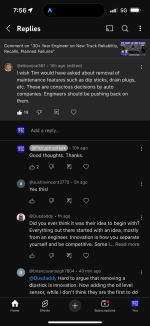Tim - "Ok, so I think what people don't understand, and I know that you do this, but people think engineers work in silos, never read any of the comments online, don't ever engage in the audience at all, but I happen to think, I know that you read forums and you read comments all the time."
Doug - "I do, yea. I'll say I scan and if something is particularly interesting I may go down that rabbit hole a bit but that's another voice of customer for us."
That's not what a silo is, at least it wasn't at all what I was referencing in my comments about silos. Sure, there should be a part of the company that is bringing customer feedback directly to the team but that's not what a silo is from a business perspective.
Here is in AI example of silo's in an engineering department at a vehicle manufacturer. Notice anything?
-----------------------------------------------------------------------------------------------
In a company, a silo refers to a situation where different departments or teams work in isolation from one another, rather than collaborating and sharing information. Silos can lead to inefficiencies, miscommunication, and slow decision-making.
Silos in a Vehicle Manufacturer’s Engineering Department
In the context of a vehicle manufacturer’s engineering department, silos can form in several ways:
- Functional Silos – Different engineering teams, such as powertrain, chassis, software, and electrical systems, may work independently and not share information effectively. For example, the software team developing an advanced driver-assistance system (ADAS) might not communicate well with the mechanical team designing steering components, leading to integration issues.
- Geographical Silos – If the company has engineering centers in multiple locations (e.g., one in Germany, one in the U.S.), teams may struggle to collaborate due to time zones, cultural differences, or different project priorities.
- Project-Based Silos – Different vehicle programs (e.g., a new electric SUV vs. a hybrid sedan) may operate separately with limited cross-communication, preventing lessons learned from one project from benefiting another.
- Supplier & Manufacturing Silos – Engineering might work in isolation from manufacturing teams or suppliers, leading to designs that are hard to produce efficiently or require costly modifications late in development.
Problems Caused by Silos in Engineering
- Delayed Innovation – Teams reinvent solutions instead of leveraging existing technology.
- Poor Integration – Systems (like software and mechanical components) may not work seamlessly together.
- Increased Costs – Duplicate efforts and inefficiencies drive up costs.
- Slow Response to Market Changes – Lack of communication makes it harder to adapt to new trends or regulatory requirements.
How to Break Silos?
- Cross-functional Teams – Create teams that mix engineers from different disciplines.
- Better Communication Tools – Use shared digital platforms (PLM, Slack, Confluence).
- Regular Meetings – Aligning goals across teams prevents misalignment.
- Leadership Support – Management should encourage knowledge-sharing and collaboration.


